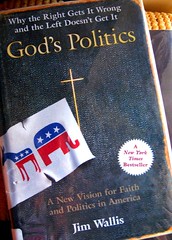 Image by elycefeliz via Flickr
Image by elycefeliz via Flickr
On another forum I frequent, one dedicated to, of all things, text-based adventure games, a discussion arose in which thread drift caused it to focus on whether or not religion was bad. Bits of the Christian bible were quoted with the claim that such passages seemed to encourage everything from rape to genocide, and the statement was made that atheism, which has no beliefs, cannot lead people to action.
The following is one of the responses, and with Crat's permission, I'm re-posting it here. We've had some recent threads on the subject of 'evil', but what I found interesting here was the suggestion that religions, with their embedded systems of ethics, provide "a necessary control layer on a population".
Do you believe Crat's premise? Does your religion provide ethical guidance? If not, what guidelines do you use for moral behaviour?
"Religion is bad"
Religion is bad in the way that books and cars are bad. Thousands are killed as a result of their use, but in themselves they are just tools for a legitimate purpose.
"Religioners are weak"
My parents love Jesus. They're really smart people and I treat this Jesus thing as an amusing idiosyncrasy, like veganism or republicanism. Folks very often need to affirm the meaning of their lives by identifying with a thing larger than themselves. It's probably a positive trait. Tends to lead to survival. It doesn't make my parents weak, it just means they recognize a specific biological need and accommodate it in a relatively harmless way.
"Religioners are crazys"
Some people are crazy. Crazy people with religion are crazy with religion. If you're handling snakes or denying adults their civil rights, your opinion of invisible pink unicorns is irrelevant. You're now
real life roleplaying where it's a hazard to you and/or others. That doesn't mean religion is at fault. It means you have difficulty distinguishing roleplaying and real life. We know a few people like that, don't we?
I think that nobody knows what's going on, nor what, if anything, it means. It can be very very hard to establish your own set of principles for correct behavior. Generally speaking (unless you concentrate on the silly bits of their scripture), religions provide a convenient set of crib notes for what's ok and what's not. Overall I think it's not only a plus, but really a necessary control layer on a population. Without it, people without the skill to develop a socially assimilable ethics of their own would tend to generate a practical hazard to themselves and others through fairly subtle but long-term deeply destructive means.
For more clever people, religion provides a right-shaped peg for an empty slot. It doesn't have to make sense. Making sense isn't the point. It's plugging that slot.
The best example I can provide is my crazy cousin. He used to think he was a chicken, and would make a real nuisance of himself. Guests would ask us why we didn't have him institutionalized, but we'd wind up having to admit "We can't. We need the eggs."
Religion is strange and nonsensical and sometimes scary, but we need the eggs.
-Cratylus




